The Baghdad bookseller: How one woman hopes to revive the literature scene in Iraq
On Baghdad's famous al-Mutanabbi Street, 30-year-old bookstore owner Bara'a al-Bayati welcomes her customers with a big smile. She is the first female to open her own bookshop on the renowned street, which attracts many curious and passionate readers.
Considered one of the oldest places in Baghdad that dates back centuries with elaborate buildings from the Ottoman Empire era, al-Mutanabbi Street boasts several bookstores and is the perfect home for avid book lovers and poets. The street, filled with bookstores and outdoor book stalls, was named after the 10th-century classical Iraqi poet al-Mutanabbi and is often referred to as the heart and soul of the Baghdad literacy and intellectual community.
"I love al-Mutanabbi Street because it makes me feel like I'm in another era in Baghdad, like the 1960's or 1970's. It reminds me of an old Baghdad, the one my mother and father told me stories about," Bara'a begins. "You can definitely feel the love of culture on this street."
But a 2007 terrorist attack left locals in shock after a powerful suicide car bomb hit the market, killing at least 20 people and wounding more than 65. The area was then closed for more than a year.
 |
This did not destroy our spirit... Instead, we started again. And this to me is the biggest point of culture, to start again |  |
"This did not destroy our spirit," Bara'a explains. "When the street reopened, it became even better than before. Yes, we live in sorrow for those innocent people who were killed in this tragedy, and despite the destruction of bookstores and cafes, the street was not left abandoned. Instead, we started again. And this to me is the biggest point of culture, to start again."
Bara'a is part of this vital reinforcement of the city's cultural roots and is helping to revive the love for literature.
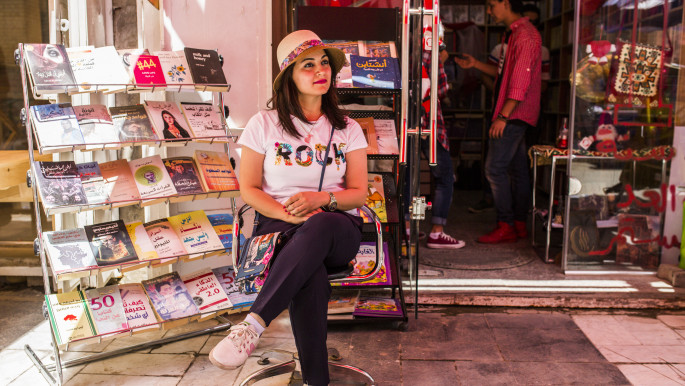 |
|
| Bara'a al-Bayati sits outside her bookshop in al-Mutanabbi Street [Alessio Mamo] |
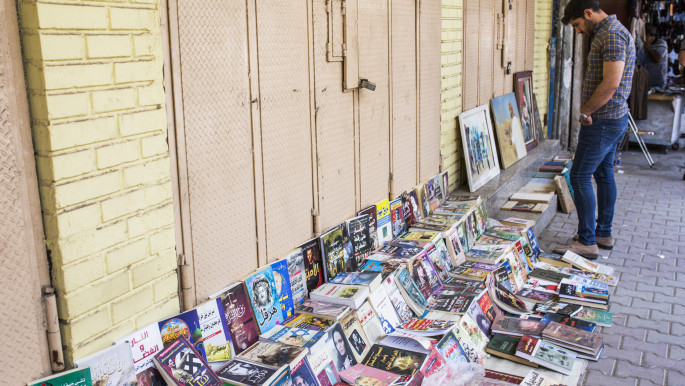 |
|
| Baghdad's al-Mutanabbi Street boasts several bookstores [Alessio Mamo] |
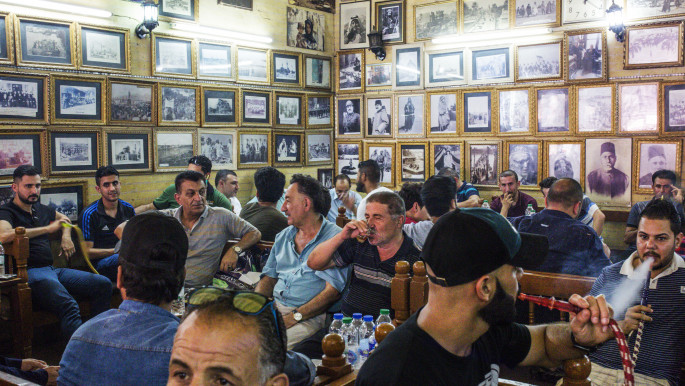 |
|
| Shabandar Coffee in al-Mutanabbi Street, the famous street of poets and booksellers [Alessio Mamo] |
"I have been passionate about literature since I was a child and wanted to become a journalist. But as I was growing up, the situation in Iraq was becoming even more difficult and dangerous. It was the beginning of the civil war in 2006, with sectarian violence high, and the security instability meant we could not move around freely.
"My father was against me taking on a journalism career as he was afraid it would be a dangerous career for me in the country, especially as a woman. He was simply afraid. In the end, I decided to study engineering and graduated in 2011."
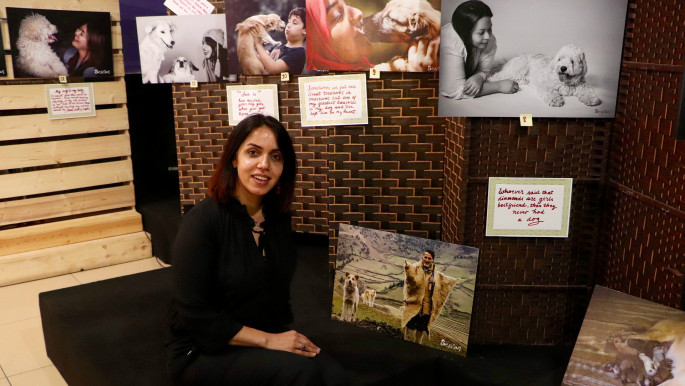 |
|
| Read also: Picture purr-fect: Rare glimpse into fluffy friendships in northern Iraq |
However, Bara'a struggled to find a job in the field, despite her degree. She would then find herself on al-Mutanabbi Street, browsing the bookstores and just enjoying the ambience of the area.
"By chance I stopped at the bookshop Dar al-Sotoor and asked them if there was any voluntary work available. I then took on a social media role where I managed their online presence. After a couple of years, I felt it was the right time for me to go independent, so I found my own shop and opened up my own publishing house."
And so, she opened Dar Maktabe Bara'a, (Bara'a's Publishing House). Dar Maktabe Bara'a has so far published 15 books, including novels and law books, and Bara'a says she hopes to publish another 15 titles this year.
However, her idea to work as a bookseller in al-Mutanabbi Street, was not just down to her love for literature, but also down to her desire to give a message to the society, especially to the youth: "If there is something you really want to do, don't wait, pursue your passion."
She further hopes this message reaches to women.
"I wish all women in Iraq are given the opportunity to realise their goals and wishes. Women make a society and it is important to give them the chance to realise their potential and make it grow."
 |
I consider the new future generation to be the foundation of society. I think Iraq can then be the country it once was |  |
A spate of violence against women has gripped Iraq recently. Protests took place late last year in Baghdad condemning the ongoing violence against women, as the number of females being killed in Iraq, under the guise of honour, grows. Every year up to hundreds of women in Iraq are killed by men belonging to tribes. They accuse women of immorality and they proudly claim to possess them and their honour, while impeding them from any decision in life or free movement.
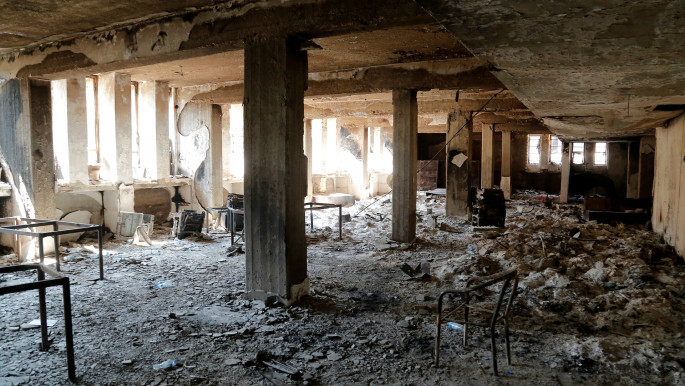 |
|
| Mending scars through heritage: Geologist who fought IS helps save Mosul's antiquities |
"This all needs to end," Bara'a urges. "And violence against women is not only killings, this can be in many forms, from forcing a woman to stay home and not get an education to child marriages."
This is why she is pushing the need for education for more women. "Educating women means educating a whole future generation in Iraq," she adds.
"Giving better access to education gives people a better access to culture, which plays such a huge role in our society. If the next generation is more cultured, it can make a change in the country.
"I consider the new future generation to be the foundation of society," Bara'a continues. "I think Iraq can then be the country it once was. There is space for women to be engineers, architects, lawyers, doctors – this is not something strange or new, it was like this before and we want it to be like this again."
In the same moment, while The New Arab was talking to Bara'a, a little girl runs into her store and comes and hugs her.
"This is binti," Bara'a says. "Her name is Sara, but I like to call her binti, 'my daughter'. She draws and acts – she is an artist already!"
The two take a photo together. "You see, I became very close to people," she tells The New Arab.
"My work is to welcome people. I give a reason to my customers to come and buy from Bara'a and not from any other bookshops. I welcome them, I advise them, I wait for them: readers, young readers, everyone is welcome. Children come to my shop with their parents because they know I have special stories for them."
Her passion for culture in her country is evident and highlighted through her zealous persona. It is not just the love for Iraq that pushes her to do what she does, but also the drive to see her fellow Iraqis succeed.
"Even if it is just a small project, you should go for it," Bara'a advises. "If I am able to fulfil my dream, then anyone here can."
Marta Bellingreri is a freelance researcher and writer, with a PhD focused on gender studies in the Middle East. Follow her on Twitter: @MartaDafne





 Follow the Middle East's top stories in English at The New Arab on Google News
Follow the Middle East's top stories in English at The New Arab on Google News


